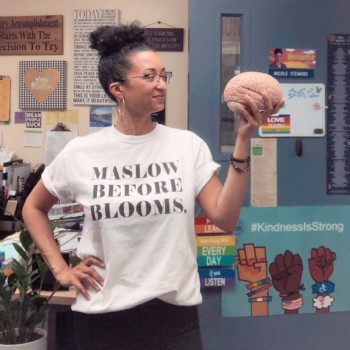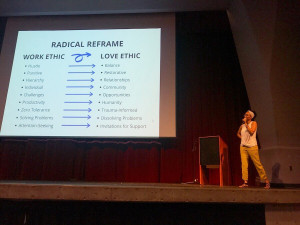 Nicole Steward, MSW, is a social worker and registered yoga teacher (RYT) with a focus on community engagement, public education, foster youth advocacy, and trauma-informed yoga.
Nicole Steward, MSW, is a social worker and registered yoga teacher (RYT) with a focus on community engagement, public education, foster youth advocacy, and trauma-informed yoga.
Throughout her two decades of experience in social work practice, Steward has noticed the need for radical self-care to discharge the toxic stress that can be absorbed through work. This awareness drives her to study trauma as well as the ways yoga and mindfulness affect our brains and bodies to keep us engaged and renewed.
Steward teaches yoga and mindfulness, offers self-care workshops and retreats, and presents courses on AudiologyOnline, Continued Early Childhood Education, OccupationalTherapy.com, Continued Social Work, and SpeechPathology.com. She has a forthcoming book about radical self-care and regularly discusses the topic on her podcast.
“By cultivating deep, courageous self-care practices—what I call radical tendencies—we can stay in this challenging work long enough to see our efforts make a positive impact in the world.”
Why did you want to become a social worker?
I was in my early teens when I realized that sometimes parents hurt their children, and I got curious about how to help children in those situations.
I volunteered in hospitals in child life and social work areas and then went on to work at CASA [the National Court Appointed Special Advocate/Guardian ad Litem Association for Children] as an advocate for children in the foster care system. Through this role, my desire to protect children grew, so I went back to school to obtain a master’s degree in social work. I found my niche in crisis work while in grad school and became particularly passionate about helping children experiencing sexual abuse.
You have spent two decades working in foster youth services, rape crisis, and juvenile justice. What led you to focus on self-care?
When I became a social worker, I was a bit naive to the depth of suffering I would be exposed to in this field. I began having nightmares and panic attacks from carrying the weight of my work. Instead of taking time for self-care, I pressed harder, which ultimately led to more severe physical reactions like hair loss, blurry vision, achy joints, and shingles.
After experiencing three major burnouts in my career, I decided to take my own self-care seriously. I found yoga and mindfulness as a treatment to the trauma I was absorbing while working with vulnerable populations.
How do you define “burnout” and why is it so important to acknowledge and address it?
Sometimes we care so much about other people that we sacrifice our own needs without even noticing. This is particularly prevalent in the human services fields (social workers, nurses, therapists, educators, etc.). We can do this for quite some time—until the lack of care we've given ourselves shows up negatively in our health, well-being, or professional choices. This is called burnout. Those of us who come into work to help others have to acknowledge the heaviness of what we’re doing and be self-aware of our own triggers that can lead to burnout. If we’re in this work because we want positive outcomes for those we serve, we cannot achieve that if we’re going to hollow ourselves out to do it.
“If we’re in this work because we want positive outcomes for those we serve, we cannot achieve that if we’re going to hollow ourselves out to do it.”
How has the practice of yoga and mindfulness allowed you to take better care of yourself and also help others?
Mindfulness allowed me the mental and emotional distance from the trauma while yoga allowed me to physically discharge the toxic stress. It changed the way I relate to those I serve and has cultivated a resilience and optimistic outlook that keeps me sustained in this work.
 Teaching yoga and offering self-care workshops that focus on understanding the neurobiology of trauma allows me to share the good news of self-care and the message of resilience.
Teaching yoga and offering self-care workshops that focus on understanding the neurobiology of trauma allows me to share the good news of self-care and the message of resilience.
I don’t want us to just survive this work but to thrive in it. By cultivating deep, courageous self-care practices—what I call radical tendencies—we can stay in this challenging work long enough to see our efforts make a positive impact in the world.
What is the value of online continuing education, and why do you like working with Continued as a presenter?
Continuing education is vital to the work we’re all doing as therapists, social workers, and educators, and in order to do our work, it’s really helpful for us to show up regulated. Continued creates a space to learn and keep us sustained for all of those that we serve. I appreciate having Continued as a platform to share the work I do with other professionals.
View Steward's courses on AudiologyOnline, Continued Early Childhood Education, OccupationalTherapy.com, Continued Social Work, and SpeechPathology.com.